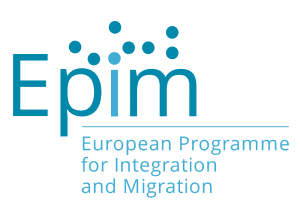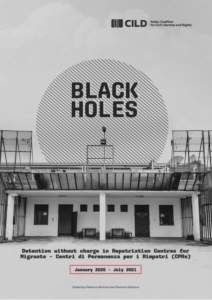Plan Together: Gathering evidence and learning on case management as an alternative to detention in Belgium
A recent information note published by JRS Belgium, based on an independent evaluation of their ATD pilot, has found that home-based case management has allowed families to stay involved in migration processes, improved their wellbeing, and had a positive impact on people’s ability to make informed decisions about their cases. In this blog, JRS Belgium Advocacy Officer and pilot project Coordinator Maaike Vanderbruggen explains their approach.
In mid-2020, JRS Belgium launched an innovative pilot project called ‘Plan Together’. This project followed many years of working with families with children in Belgium’s return houses. The return houses (also called ‘Family Identification and Return Team (FITT) houses’, ‘Turtelboom houses’, or ‘open living units’) are set up to accommodate families with children instead of holding them in a formal immigration detention centre. In theory the return houses are semi-open accommodation; children can (in principle) go to school and adults can leave for a number of reasons such as to go shopping, see their lawyers, or go to a doctor’s appointment. However, an adult must always be present in the house and thus in effect an extreme level of deprivation of liberty has resulted from the use of return houses. Moreover, return houses are often located in remote areas with limited access to essential services. In reality, therefore, this practice amounts to another form of detention, depriving people of their liberty and violating the rights of the men, women and children held in them. It is JRS Belgium’s view that return houses are never in the best interest of the child.
As an organisation working to end the practice of immigration detention, JRS Belgium is constantly on the lookout for alternative approaches that can be used to encourage governments to adopt frameworks that respect the rights of migrants, do not use enforcement or imprisonment, and allow people to live in the community while they work to resolve their migration case. The concept of alternatives to detention (ATD) seemed to be an excellent opportunity to explore a different way of doing things.
Independent holistic case management for families with children
As a member of the International Detention Coalition (IDC), we had been following with great interest a number of pilot projects being carried out in other European countries since 2017. The experience of the organisations running ATD pilots in Bulgaria, Cyprus, Greece, Italy, Poland and the UK – who made up the members of the European ATD Network – inspired us to put in place the same methodology, namely holistic case management, for undocumented families with minor children living in Belgium. Our aim was to enable the families to remain engaged in their migration case without being placed in immigration detention.
Through the project, the families that we work with receive support from a case manager. Our approach is unique in that we provide support to people in their homes; this ensures that case management is provided in an environment where people feel safe and comfortable. Once somebody decides to participate and has been accepted onto the pilot, they receive regular visits to discuss their situation, identify how the caseworker can support them – taking into account their strengths as well as their needs and specific vulnerabilities – and develop an individualised action plan. The caseworker then works with each individual in the family to put in place this action plan, reviewing and updating it at each meeting. These action plans generally include a range of issues – from education, training and employment to health and wellbeing to working through their legal case. With their agreement, caseworkers can propose ways to help family members to overcome certain challenges they are facing, for instance by putting them in touch with specialists such as lawyers or medical professionals. Key to this process of case management is that people’s rights are respected throughout and they are given the tools that allow them to take well-informed decisions when it comes to their future. The ultimate aim of this approach is to support people to find a durable solution, which may mean legal residence in Belgium, in another EU country, or (in some cases) returning to their country of origin.
With this project, we are testing the hypothesis that case management is a legitimate and effective alternative to detention. We are gathering evidence and learning points to better understand the impact of case management.
Evaluating our impact and drawing out lessons
In March 2023, JRS Belgium published the results of an independent evaluation of the pilot (the English note can be found here). The evaluation found that:
- Home-based case management had a positive impact on families’ ability to stay involved in and engaged with the migration processes affecting them;
- The case management-based model had a positive impact on people’s ability to make informed decisions; and
- The pilot helped to improve people’s wellbeing.
One area where we didn’t have so much success was in supporting people to obtain timely and quick resolution of their cases, perhaps unsurprising given that this is dependent on the decision-making of the Belgian authorities, which can often be an extremely long process and is beyond the control of the case manager.
The information note lists a number of important observations and learning points, such as how key relationships of trust are if case management is to be a success. Crucially, people needed to trust not only in the case management process but also that they would receive reliable, impartial legal assistance and a high-quality decision on their case. Yet trust in the authorities can be a huge challenge, especially given the long procedures and previous negative experiences of those involved in the pilot.
JRS Belgium also includes recommendations for both government and other actors who want to work with families with children. We hope in this way to contribute to shifting the government’s exclusive focus on increasing the return rate of migrants living with irregular status to promoting durable solutions, and abolishing immigration detention once and for all.
Written by Maaike Vanderbruggen (Advocacy officer and Plan Together Project Coordinator, JRS Belgium). Photo by Kristien Vliegen, JRS Belgium. Find out more about Plan Together here.






